This post may contain ads and affiliate links and we may earn a small commission when you click on the links at no additional cost to you. As an Amazon Affiliate, we earn from qualifying purchases. You can read our full disclaimer here.
Unique Traits of Golden Retrievers: Unveiling Their Distinctive Charms

Unique traits of Golden Retrievers, like their super friendly and easygoing nature, make them a huge favorite among dog lovers everywhere.
These pups are famous for their shiny golden coats and their ability to adapt to many roles – they’re perfect family pets and also amazing working dogs.
They’re very smart and love to please, which makes them awesome at obedience and super useful in jobs like search-and-rescue, therapy work, and other service roles.
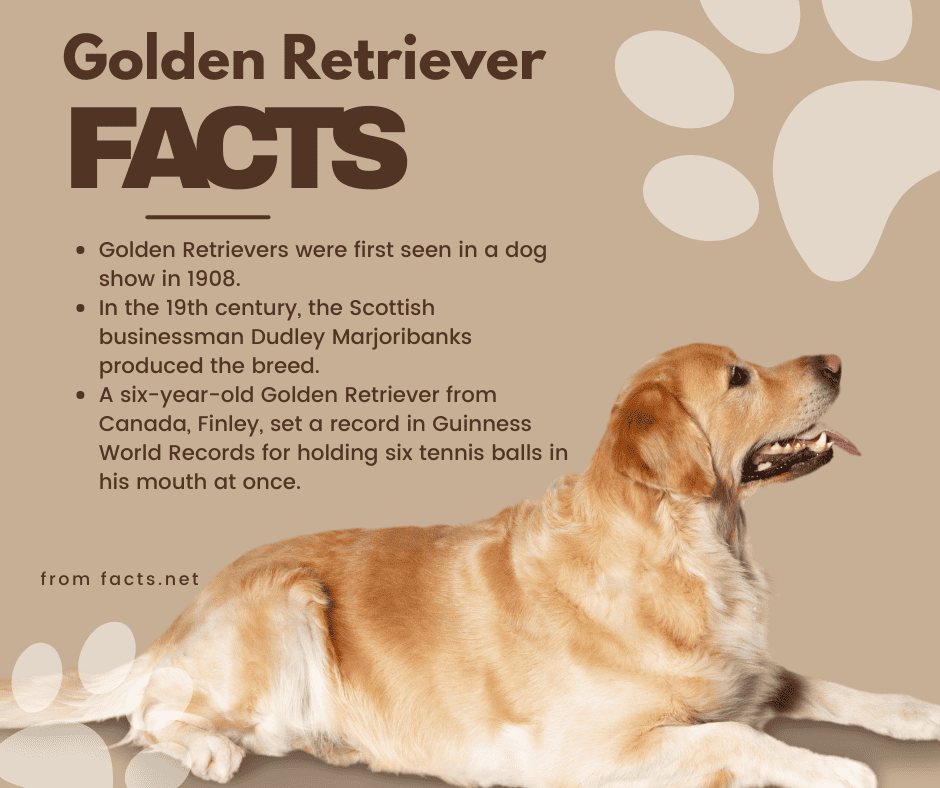
Beyond their work ethic, Golden Retrievers have a range of characteristics that might surprise you. They possess a natural affinity for water and are capable swimmers, a trait that can be traced back to their history of being bred for retrieving waterfowl.
This is complemented by their distinctive water-repellent double coat and “duck-like” feet, which aid in swimming. The breed’s social nature means they generally get along well with people and other pets, and they are known for maintaining a playful demeanor well into adulthood.
Key Takeaways of Unique Traits of Golden Retrievers
- Golden Retrievers are adaptable to both family and service roles due to their intelligence and friendly nature.
- Their physical features, like water-repellent coats, aid in swimming, an activity they are naturally drawn to.
- The breed’s social and playful personality makes them a joy in various settings, from homes to therapeutic environments.
Breed Origins and History
The Golden Retriever is a popular dog breed with a storied history that dates back to the 19th century in Scotland.
You can trace the breed’s roots to the highland estate of Sir Dudley Marjoribanks, also known as Lord Tweedmouth. He aimed to develop a skilled retrieving dog suited for the rugged Scottish terrain and variable weather conditions.
Lord Tweedmouth methodically crossed his “Yellow Retriever” with the now-extinct Tweed Water Spaniel. This deliberate breeding resulted in a dog adept at retrieving from both land and water, an invaluable trait for hunting in the Scottish Highlands.
Through selective breeding, Lord Tweedmouth enhanced the Golden Retriever’s soft mouth for game retrieval and its unwavering loyalty to owners.
Your appreciation for this breed grows when you learn that Golden Retrievers were first officially recognized by The Kennel Club in England in 1911.
They were initially classified as “Retriever – Yellow or Golden” before being officially named “Retriever – Golden” in 1920.
Their legacy, firmly rooted in Scottish origin, blossomed as they became beloved worldwide for their intelligence, dexterity, and amiable nature.
Defining Physical Characteristics and Unique Traits of Golden Retrievers
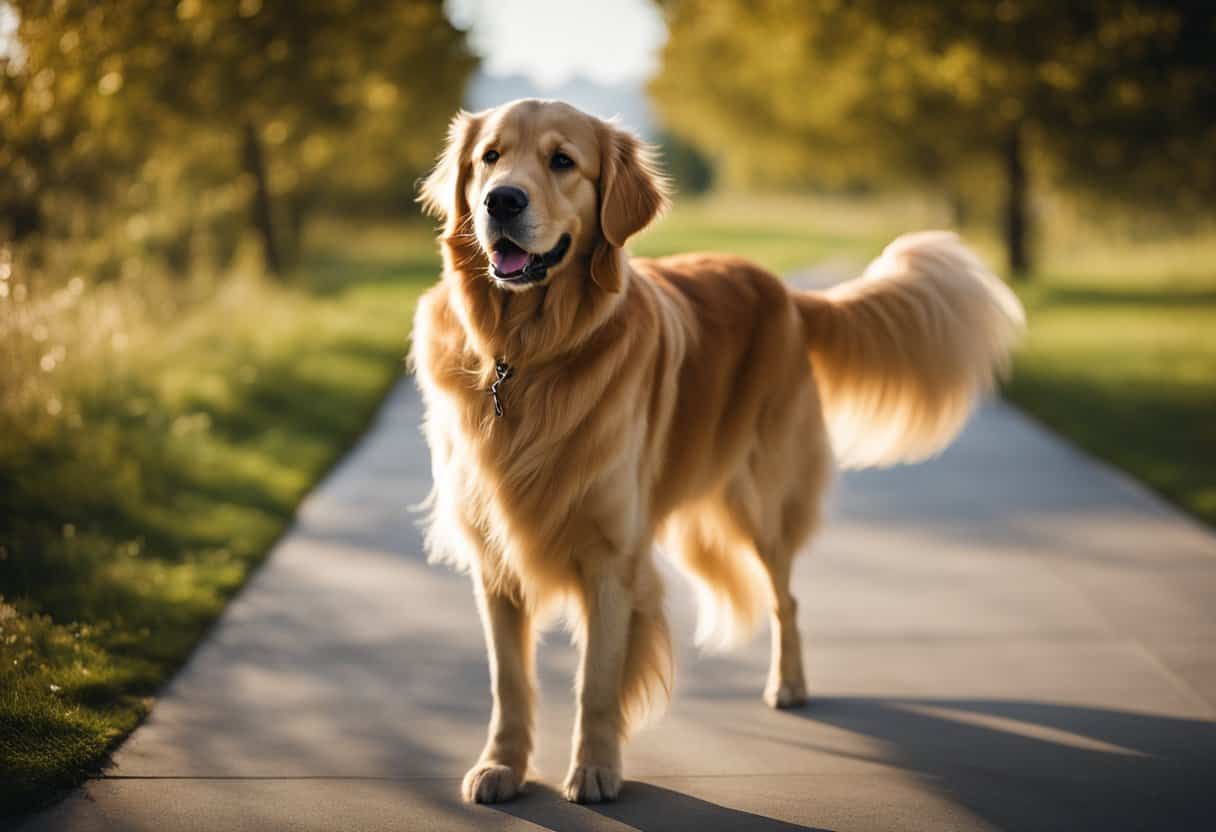
Golden Retrievers boast distinctive attributes that set them apart in the canine world. These traits not only define their appearance but are crucial to their function and overall health.
Coat and Coloring
Golden Retrievers are famed for their luxurious double coat that features a softer undercoat and a protective outer coat.
This double layer not only keeps them warm in winter but also acts as a water-repellent barrier, helping them stay dry while swimming or in damp conditions.
The color of their coat ranges from light cream to a rich golden hue, and it’s a hallmark of the breed.
- Shedding: Moderate to heavy shedding is expected, especially during seasonal changes. Regular grooming helps control the amount of hair and maintains the coat’s condition.
- Maintenance: Brushing your Golden Retriever a few times a week prevents tangles and mattes, especially in the dense undercoat.
Size and Build
Your Golden Retriever’s size and build are a testament to their origins as capable hunting companions:
- Weight: Males typically weigh between 65-75 pounds, while females are generally lighter at 55-65 pounds.
- Height: At the withers, males stand about 23-24 inches tall, with females slightly shorter, around 21.5-22.5 inches.
These dimensions contribute to their strong, well-proportioned physique, built for endurance and agility.
Temperament and Personality
Golden Retrievers are synonymous with a temperament that is as golden as their lush coats. Their personality glows with friendliness, and they exude a gentle nature that makes them ideal companions.
Behavioral Traits
Golden Retrievers exhibit a range of behavioral traits that are highly valued by pet owners. They are notably intelligent, which renders them easy to train across various tasks and commands.
Their eagerness to please paired with a characteristic soft mouth—the ability to carry items gently without damaging them—is a testament to their calm, affectionate nature.
- Gentle: Known for their mild disposition, they handle interactions with care.
- Loyal: A steadfast companion, you can count on their unwavering support.
- Intelligent: Their sharp wit is evident in their capacity for learning and problem-solving.
Social Temperament
Your Golden Retriever’s social temperament is marked by unconditional love and a friendly demeanor that extends not just to you but to strangers and other animals alike.
Their affectionate approach is coupled with a loyal spirit, ensuring they are devoted family members.
- Affectionate: They show a deep bond through their endearing behavior.
- Friendly: Whether it’s family or new faces, they greet with enthusiasm.
- Calm: In social settings, they maintain a composed and tranquil presence.
Health and Wellness Unique Traits of Golden Retrievers
When caring for a Golden Retriever, understanding their specific health needs can ensure they lead a happy and healthy life. Paying attention to their common health concerns, nutritional requirements, and exercise needs is key.
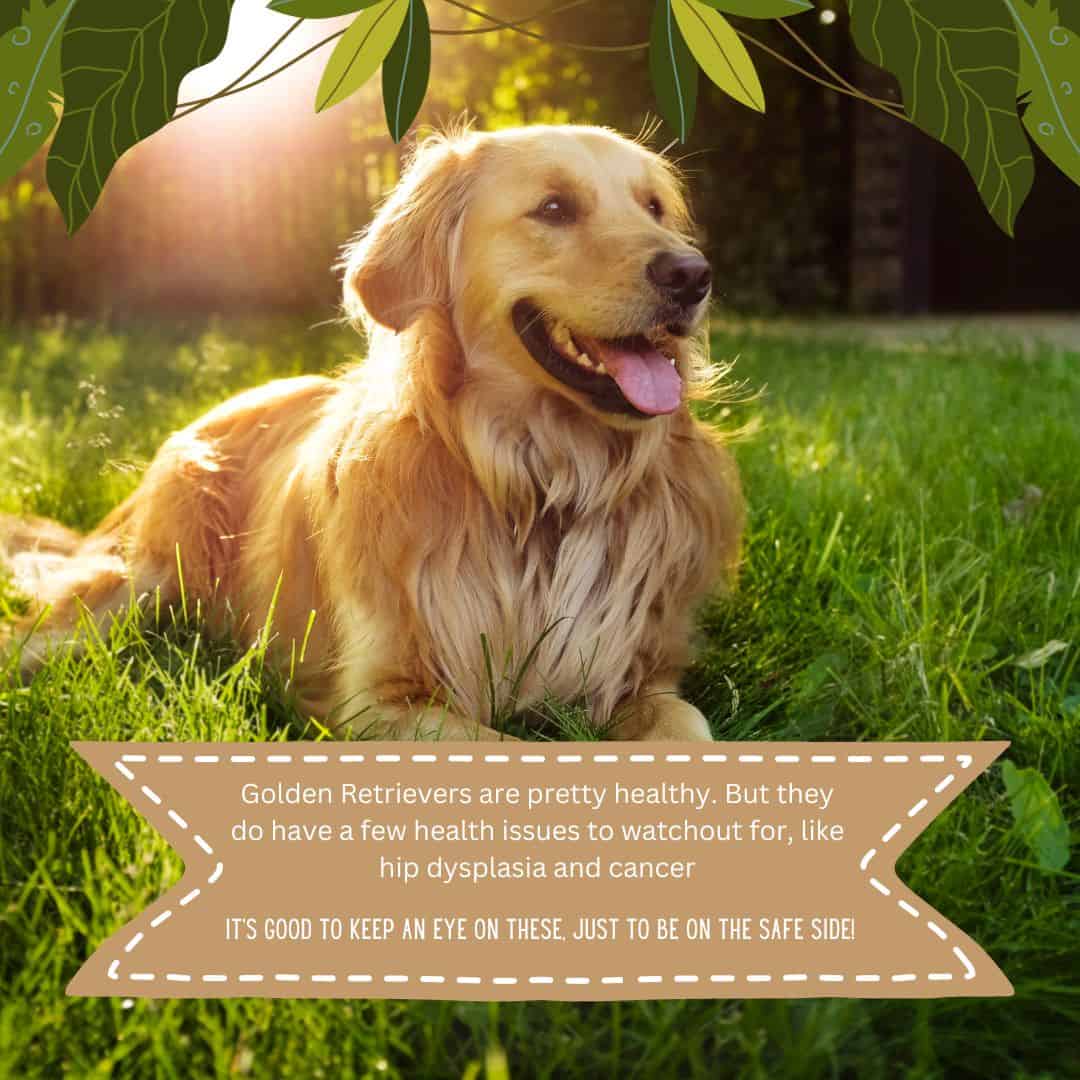
Common Health Issues
Golden Retrievers are generally healthy, but like any breed, they are prone to certain health problems. It’s important for you to be aware of conditions such as hip dysplasia and cancer, which are unfortunately common in this breed.
Regular check-ups can help spot issues early, and genetic testing can provide insight into your dog’s health risks. Watch for eye problems too, another area of concern for these dogs as they age.
Nutrition and Diet
Your Golden Retriever’s diet is fundamental to their health. They should have a balanced diet tailored to their activity level, age, and any specific health concerns.
Obesity can be a challenge, so monitoring food intake and providing a diet rich in nutrients is vital.
Veterinary nutritionists often recommend a diet that supports bone and joint health, particularly due to the breed’s predisposition to hip dysplasia.
Exercise Requirements
Golden Retrievers are known for their energy and exercise needs. They require regular physical activity to maintain a healthy weight and prevent behavior issues.
Activities like swimming are an excellent form of low-impact exercise benefiting their joints.
Aim for at least an hour of exercise daily, but as they age, their activity levels will likely decrease, and you’ll need to adjust their exercise regimen accordingly.
Work and Service Unique Traits of Golden Retrievers
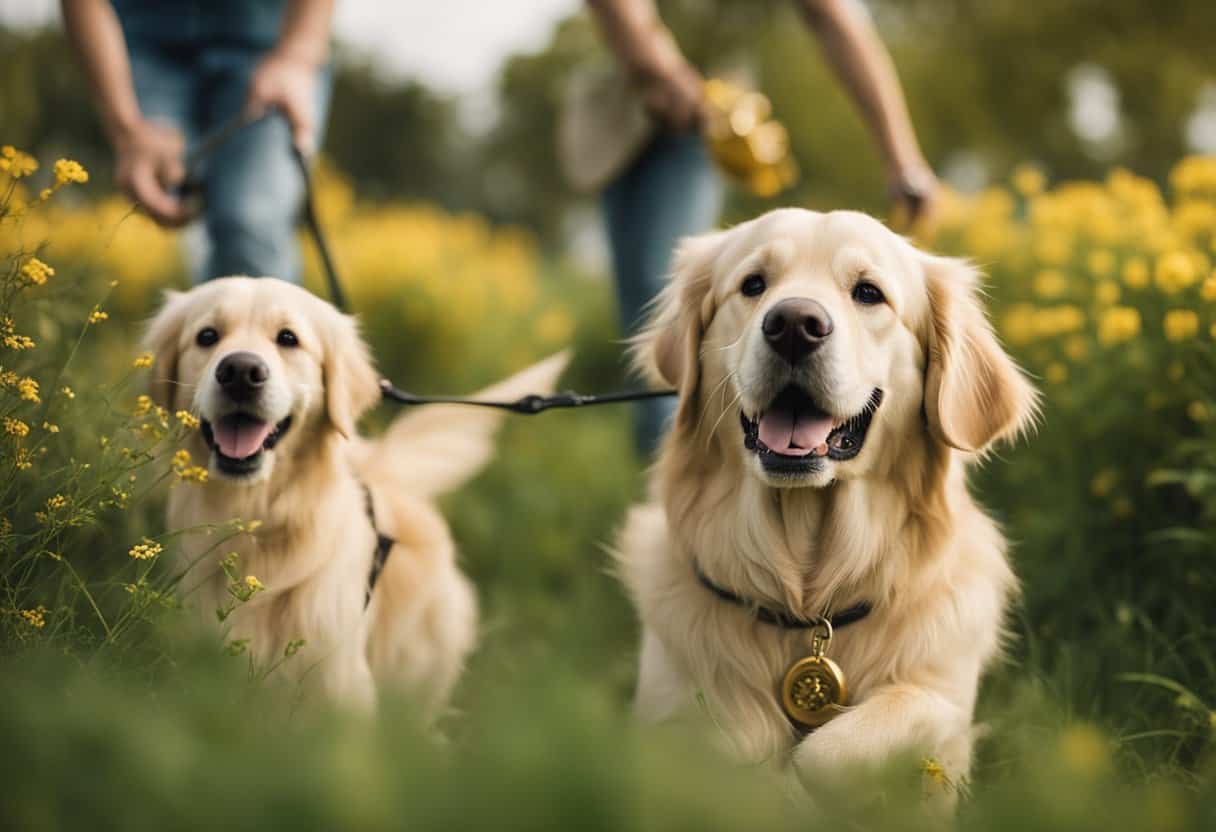
Golden Retrievers excel not only as devoted companions but also in various work and service capacities due to their intelligence and trainable nature.
Service and Therapy Roles
Golden Retrievers are highly sought after as service dogs because of their ability to learn skills quickly and exhibit a gentle demeanor.
Your Golden Retriever can be trained to perform a wide array of tasks that cater to specific disabilities, including mobility assistance and acting as a guide for people who are blind or visually impaired.
As therapy dogs, they play a different, yet vital role, providing comfort and emotional support in various therapeutic settings due to their friendly and attentive attitudes.
Skills Service Dogs May Learn:
- Guide tasks
- Mobility assistance
- Retrieve items
Ideal Therapy Dog Qualities:
- Friendly and sociable
- Calm and attentive
- Comforting presence
Hunting and Sporting Functions
In the field of hunting and sporting, the natural nous of Golden Retrievers makes them excellent hunting dogs. Their abilities are rooted in their history, as they were originally bred for retrieving game in hunting scenarios.
You can count on their agility and soft mouths that ensure unharmed retrieval. In addition to hunting, Golden Retrievers excel as search and rescue dogs, using their keen sense of smell to find and aid people in distress.
Hunting/Sporting Aptitudes:
- Retrieving game unharmed
- Agility and endurance
- Excellent trackers with a strong sense of smell
Training and Obedience Unique Traits of Golden Retrievers
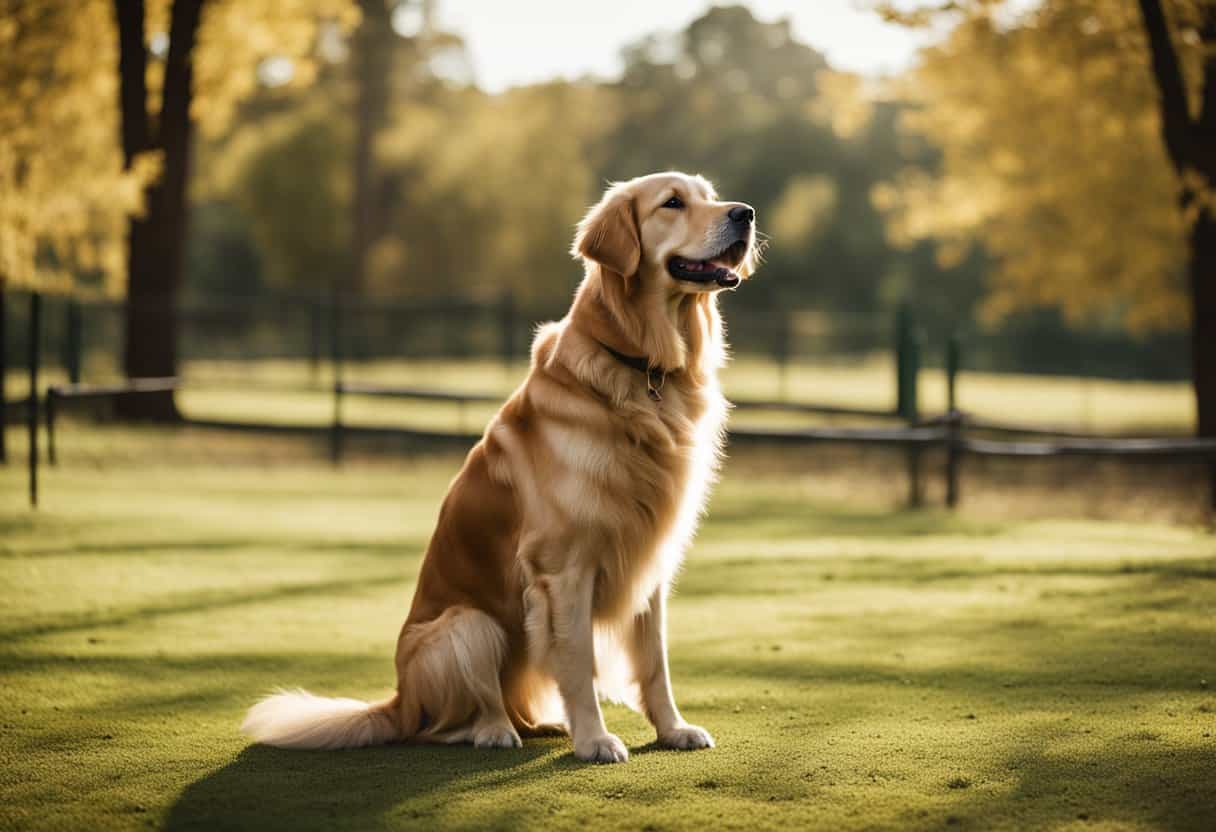
When you train your Golden Retriever, remember that these dogs are known for their high intelligence and eagerness to please, making them highly trainable.
Proper training and obedience are key to harnessing their potential.
Training Techniques
Golden Retrievers respond well to positive reinforcement. Focus on rewarding good behavior with treats or praise. Begin training early to establish good habits and socialization. It’s essential to be consistent;
Golden Retrievers thrive on routine. Use clear, concise commands and train in short, focused sessions to keep their attention.
Obedience and Commands
Obedience training instills discipline and helps manage the behavior of your Golden Retriever. Commands like ‘sit’, ‘stay’, and ‘come’ are foundational.
Since they are intelligent and easy to train, you can quickly move on to more complex tasks. Regular training not only enhances obedience but also strengthens your bond with your dog.
Golden Retrievers in the Family
Golden Retrievers are renowned for their gentle nature and are highly valued in family settings for their loyalty and friendly temperament.
Interaction with Children and Pets
Golden Retrievers are notably good with kids, showing a natural patience and gentleness that make them excellent companions for children.
This breed’s affectionate personality shines when interacting with young family members, where they often exhibit protective yet playful behavior.
Additionally, these dogs typically get along well with other pets, including cats, due to their sociable nature, making them a harmonious addition to a household with multiple animals.
Adaptability to Family Life
Golden Retrievers adapt seamlessly into the lives of families. They’re eager to please their owners, which, paired with their intelligence, makes them relatively easy to train—a trait that busy parents appreciate.
Their flexible personality means that whether you reside in a house with a yard or an apartment, a Golden Retriever can comfortably fit into your space and lifestyle, as long as they receive enough daily exercise and attention.
Grooming and Care
Golden Retrievers are known for their luxurious golden coat which requires regular maintenance to stay healthy and shiny.
Proper grooming is essential to manage shedding and ensure the cleanliness of your Golden Retriever.
Coat Maintenance
Your Golden Retriever’s coat has two layers: a water-resistant outer coat and a soft undercoat. Together, they provide insulation and protection, but they also mean that shedding can be a substantial issue, especially during seasonal changes.
To minimize excess hair and maintain coat health, brushing several times a week is crucial. Use a slicker brush to gently remove tangles and a de-shedding tool to thin out the undercoat efficiently.
Cleanliness is also a key part of coat maintenance, so occasional baths will keep their coat fresh and reduce the build-up of dirt.
Grooming Schedule
Implement a consistent grooming schedule for your Golden Retriever:
| Activity | Frequency |
|---|---|
| Brushing | 2-3 times per week |
| Bathing | Monthly |
| Nail Trimming | As needed |
| Ear Cleaning | Weekly |
Regular brushing keeps their coat free of mats and lessens the amount of hair shed around your home. Bathing your dog once a month, or as needed when especially dirty, helps to keep their skin and coat in optimal condition.
Remember to check and clean their ears weekly to prevent infections that can often go unnoticed.
Golden Retriever Ownership
Embarking on the journey of Golden Retriever ownership brings joy and a few challenges. These dogs are known for their loyal and affectionate nature, making them an ideal family pet.
They require a dedicated owner who’s ready to meet their care needs as they mature.
Choosing a Golden Retriever
When selecting your Golden Retriever, prioritize traits like temperament and health. Reputable breeders, often registered with the American Kennel Club, are a good starting point for healthy puppies.
They can provide insights into the breeding process, ensuring you get a loving, well-adjusted companion.
- Temperament: Seek puppies that exhibit a calm demeanor yet willing to engage, a sign of a confident future family member.
- Health: Ensure breeders perform genetic testing to minimize the likelihood of inherited conditions.
Expectations of Care
Your Golden Retriever will require regular exercise, grooming, and training to thrive.
- Exercise: Golden Retrievers have high energy levels, so daily exercise is critical to manage potential anxiety and maintain their health.
- Grooming: Their beautiful coat requires regular brushing to stay clean and free of mats.
- Training: Recognized for their intelligence, these dogs respond well to consistent, affectionate training—a benefit to both the pet and owner.
A well-cared-for Golden Retriever will express their happiness through wagging tails and the occasional affectionate lick as they lay by your bed, affirming their role as a loyal companion in your life.
Unique Traits of Golden Retrievers: Behavioral Considerations
When considering a Golden Retriever as a pet, you need to be aware of their unique behavioral traits that require particular attention during training and socialization.
Common Behavioral Concerns
Barking: Golden Retrievers may bark to alert you of guests or unusual events. However, with proper training, they can learn to minimize unnecessary noise.
Aggression: While these dogs are typically gentle and friendly, aggression can occur, often stemming from poor socialization or fear. Early and consistent socialization is crucial to prevent these behaviors from developing.
Anxiety: Separation anxiety is common due to their sociable nature; it’s important for you to gradually acclimate them to being alone to mitigate anxious behaviors.
Behavioral Training: Implementing consistent behavioral training from a young age ensures that you can curb unwanted behaviors effectively. Establish rules and stick to them so your Golden Retriever understands what is expected.
By recognizing these considerations and addressing them through training and socialization, you will ensure a harmonious relationship with your Golden Retriever.
Activities and Play Unique Traits of Golden Retrievers
Golden Retrievers are known for their high energy levels and love for play. Keeping them engaged through various activities is essential for their physical and mental well-being.
Indoor and Outdoor Play
Indoor Play: When you’re indoors, your Golden Retriever can still release energy through play. They adore chasing a ball or playing tug-of-war with a sturdy rope toy.
Remember, indoor play doesn’t need to take up much space—a game of hide and seek with your dog can be just as stimulating.
Outdoor Play: Your Golden Retriever’s playful nature truly shines outdoors. They love activities like swimming and retrieving objects, which can greatly contribute to their exercise routine.
An activity like an agility course can channel their energy and encourage them to navigate through varying obstacles. It’s a fun way to bond and keep their joints healthy.
Interactive Games and Activities
Games become a platform for your Golden Retriever to learn and display their intelligence. Engaging in interactive games like treat scavenger hunting can sharpen their problem-solving skills and provide mental stimulation.
Simple commands become part of play when you teach your dog tricks, such as rollover or shake a paw. These activities become a fun way to improve their behavior and obedience.
Remember, it’s about making the most of your Golden Retriever’s active lifestyle and energy through play, which strengthens your bond and keeps them healthy.
Life Stages of Golden Retrievers
As you explore the life stages of Golden Retrievers, you’ll see how they develop from playful puppies to dignified seniors. Understanding these stages will help you provide appropriate care at every age.
Puppy to Mature Adult
During the puppy phase, which begins at birth and can last up to two years, your Golden Retriever experiences rapid growth and development.
By about two weeks, puppies typically open their eyes.
Within the first three months, they transition from total dependence on their mother to a more adventurous stage, where socialization and basic training are critical.
- 8 Weeks: Weaning from the mother’s milk and beginning to eat solid foods.
- 2-4 Months: Primary socialization period; exposure to different people, pets, and environments is essential.
- 6 Months: Teething begins, and puppies may chew more during this time.
As they age, their training progresses into more complex commands and behavior shaping, especially as they navigate through their energetic and sometimes challenging adolescent period.
During this adolescent stage, Golden Retrievers may test boundaries, requiring consistent training and patience.
By the time they reach maturity at around two years of age, they should have a well-established routine, having been shaped by earlier training and experiences.
Mature adults exhibit the breed’s characteristic friendly and gentle demeanor, but maintaining physical activity and mental stimulation remains important to keep them healthy and well-behaved.
Senior Years
When your Golden Retriever reaches the senior stage, typically around eight years of age and older, they’ll require different care. This phase can be highlighted by a significant slow-down in energy levels and the potential onset of age-related health issues.
- Health Checks: Regular veterinary check-ups become even more crucial to monitor for any signs of diseases common in older dogs, such as arthritis or heart problems.
- Diet Adjustments: Their diet may need modification to accommodate slower metabolism and less activity.
Maintaining a comfortable and accessible environment for your senior Golden Retriever can help ease any discomfort associated with aging. Providing soft bedding and avoiding stairs can improve their quality of life during these golden years.
Senior Golden Retrievers may have a lower energy level, but they still enjoy gentle affection and may benefit from short, leisurely walks. It’s essential to balance activity with rest, as their needs change with age.
Understanding the behavior changes during the Golden Retriever’s lifespan is crucial to provide appropriate care and support at every stage.
Whether you’re comforting a teething puppy or aiding a senior dog, your attentiveness and care shape their well-being throughout their life stages.
Frequently Asked Questions
In this section, you’ll find detailed answers to some of the most common questions about Golden Retrievers, from their distinct appearance to the traits that make them beloved pets.
What are the distinguishing characteristics of Golden Retrievers?
Golden Retrievers have a dense, water-repellent outer coat with a thick undercoat that can vary in color from cream to a rich golden. Their broad heads, friendly eyes, and powerful bodies are distinctive traits that set them apart.
What is the typical personality of a Golden Retriever?
You can expect a Golden Retriever to be friendly, loyal, and patient. They are known for their gentle nature with children, their ease with other pets, and their innate desire to please their owners.
What special skills do Golden Retrievers possess?
Golden Retrievers excel due to their intelligence and versatility. Their skills make them top choices for roles in search and rescue, as therapy dogs, and as guide dogs for the blind.
What are the common colors for Golden Retrievers?
The breed standard recognizes several shades of Golden Retrievers’ colors, ranging from light cream to a dark golden hue.
How does the American Golden Retriever differ from other types?
American Golden Retrievers generally have a slimmer build and less feathering than their English counterparts. They may also have a coat color that is on the darker side of the breed’s spectrum.
What are some fun facts people might not know about Golden Retrievers?
Despite their mature appearance, Golden Retrievers often retain their playful puppy-like behavior well into adulthood. They also have an impressive ability to stay young at heart, making them a joyful companion at any age.
Final Thoughts on Unique Traits of Golden Retrievers
In conclusion, the unique traits of Golden Retrievers truly set them apart as one of the most beloved dog breeds. Their combination of a friendly demeanor, intelligence, and a versatile skill set makes them not just wonderful companions but also invaluable in various service roles.
Whether it’s their heartwarming presence in a family setting or their dedicated service in search-and-rescue or therapy, Golden Retrievers continue to win hearts and show just how special they are.
-

Coffee Mug – In Dog Coffees I’ve Only Had One
$11.95 – $14.95 Select options This product has multiple variants. The options may be chosen on the product page
